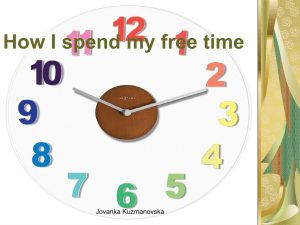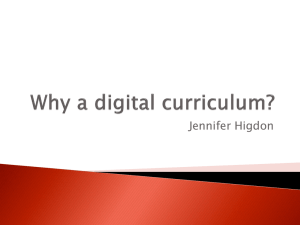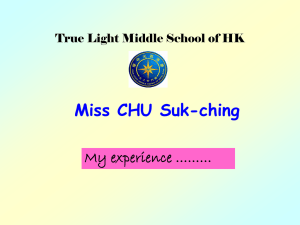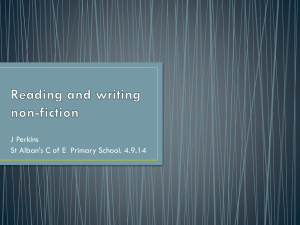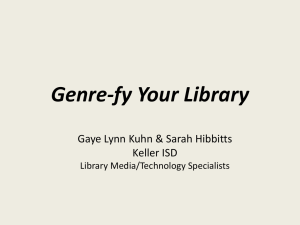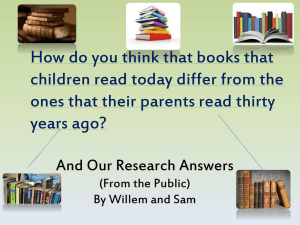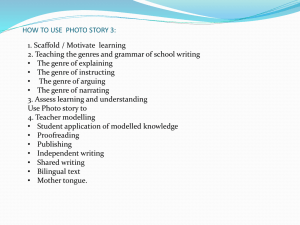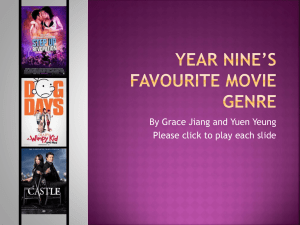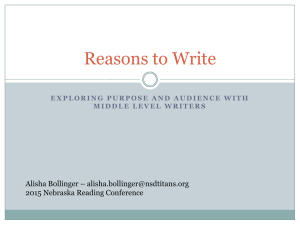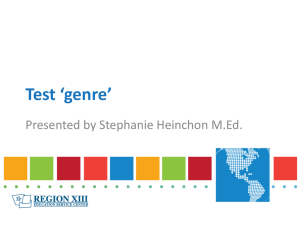Unit Four overview
advertisement
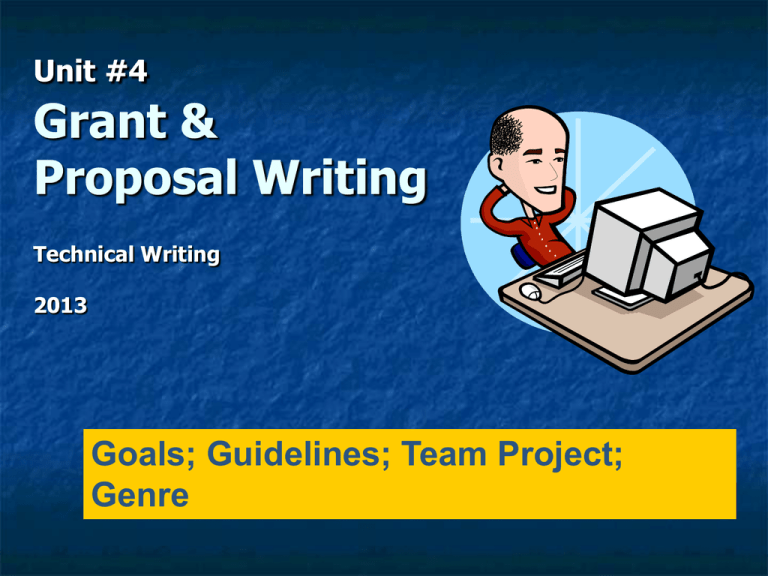
Unit #4 Grant & Proposal Writing Technical Writing 2013 Goals; Guidelines; Team Project; Genre Two broad goals for this unit 1. 2. To gain an understanding of the genres associated with the social act of “proposing,” especially proposing projects in organizational settings To gain an understanding of how best to coordinate the various genres of proposing in order to successfully persuade others to support our projects “A Genre System View” “Connor’s (2000) study hints at this interactive nature of grant funding genres, as she claims that the genre of a grant proposal does not exist in isolation but is part of a system of interacting genres” (pp. 22-23). Connor’s statement suggests that grant writers require knowledge of multiple genres spanning a variety of rhetorical contexts and discourse communities. Yet, despite the crucial role of grant genres in the production of knowledge and the complexity of the grant-writing genre system, these interacting genres have yet to be studied.” Tardy, p.2 Tardy & You… “Exploration of this [grant proposal] genre system is the focus of this article.” Tardy, p.2 In the midterm, you will conduct your own exploration of the genre system of proposal writing, choosing a site to investigate that will inform your own forays (present or future) into grant writing. Tardy’s Questions What genres and communities interact to form the genre system of proposal writing for seeking space in… What are the roles and functions of this genre system? What type of knowledge does participation in the text genres and genre system require of grant writers and how do these writers develop such knowledge? You’ll want to modify and add to these to suit your own project What’s a “genre system?” 3 key assumptions for Tardy: • Genres are social action; typified responses to recurring situations • Genres are used and work together, creating a kind of interactive system • Specialized knowledge is required to use genres and to act within genre systems How do you study genres as social action? Tardy used the following methods • Interviews with writers • Analysis of documents – samples of the various genres used Note that these methods tend to yield a retrospective account of the social action. That is, we see and learn from the results of action or from accounts of action given by the writer. What should you watch for in your future career? Evidence of… The specialized knowledge required to use genres and act in genre systems. Individual moves • what genres are used? • in what sequence? • for what purposes? • in what situations? Community rules • what genres are required or optional? • what patterns of use lead to success? Propose a Midterm Project Your goal in this assignment is to identify a major project. You will be responsible for defining the project, thinking about different sources of support, and creating all the necessary materials to secure support from those sources. You may seek support for a project of your own, or you may do so on behalf of an organization you have a relationship with. Your deliverables… 1. Letter of Introduction, Title Page, Table of Contents 2. Background, Methodology, Qualifications, Benefits I will be sending a second PPT this week. It will explore the six generic slots of the proposal genre (listed above). For now, decide which of the team’s project ideas you would most like to use as your team’s midterm assignment. Choose something small The issue you choose to build your proposal around should not be a major one. You will have to wrap it up in a short amount of time. Examples: I will send examples via email. When is it due? June 23rd, 11:59 p.m. Note: this means that the proposing should be wrapped up in time for you to edit and revise. Instructor’s Caution: Proposals are not Reports Proposals argue “here is how we would go about answering your question.” Reports (e.g. recommendation reports) argue “this is our answer to the overriding question” The lesson: proposals explain how to answer a question…they don’t give the answer. A report gives the answer. Choose something appropriate Option 1: Proposing a new review process ISUComm center technical reports series. Not “here’s what the process should look like” but “here’s how we should go about determining the best process” Option 3: Proposing a cleaning schedule for fraternity house public rooms, kitchen, and bathrooms. Not “here’s the new cleaning schedule” but “here’s how we can create a cleaning schedule that everyone can live with” Communication for Two Student Teams E-mail IM f2f/ phone Red team 27 0 10 1 38 Purple team 57 5 2 0 64 Other Total These teams were writing a proposal for a new technical product. Their task was to show that their design was state-of-the-art. You know your idea is good when… You are proposing methods to answer a question, not reporting results that come from performing those methods. You don’t know the answer already. You can’t get to the answer by yourself; you need the cooperation of the people you are proposing the idea to. Tardy: a good guide “grant proposals function within a larger system of documents with which writers interact as they navigate through the grant-writing process. Documents such as letters of intent and grant-writing guidelines, as well as faceto-face interactions with program officers, are all interconnected genres within the grant-writing process.” Tardy, p. 11 How should I collect documents? What should I watch for? What Motivates Writers of Proposals? “The sense of purpose that shapes strategy is something more concrete, more immediate, and less encompassing: it is not generic but operational. Generic purposes are ideal and therefore simple…Operational purposes are specific to real situations and often quite complex.” What Motivates You? Possibly: •Solving a problem or performing a task according the instructor’s directions •Impressing (or refusing to impress) the instructor •Receiving an acceptable grade •Revealing or concealing real attitudes, opinions, beliefs •Creating or sustaining an acceptable self-image •Receiving peer approval or avoiding disapproval Logical Structure of Proposals Introducing The Baseline Logic Current situation Desired Result More to come on Baseline Logic Benefits The “slots” Situation Objectives Methods Qualifications Costs Assessment Plan Benefits All slots must be filled, but slots are not always sections and they don’t necessarily proceed in this order. Drafting your p1 proposal Situation Slots in yellow are well-defined by the project description in your notes. Objectives Methods Qualifications Costs Assessment Benefits Plan Slots in white are made up of new information that you must provide. The Situation slot is a combination of info you were given, and info you must provide. Style: PIP : A fractal organization scheme for proposing Persuade Inform Persuade Try it: proposing an activity Persuade Inform Persuade To ensure that our visualizations are usable, we will invite two expert reviewers from the field of information visualization to comment and give feedback on the design. Paul Dourish & Barbara Mirel are two leading researchers in the areas of information visualizationa and computer-supported cooperative work. Both have agreed to support this project by serving as reviewers. We believe that with the help of Mirel & Dourish, our visualization tool can be integrated into the work practice of proposal writers who have not previously used self-analytic tools to improve their performance. Scaled up: PIP for methods slot Line of Argument: Here is a methodological approach that has been shown to be sound in these previous studies/projects. Persuade Inform Persuade Line of Argument: We are using the methodological approach, adapting for our specific project in these ways. Line of Argument: Based on our pilot study and previous published work, here are the positive outcomes we expect that match with the goals stated in the RFP. (e.g. replicability, validity, etc.) Scaled down: PIP elevator speech Persuade Inform Persuade Some colleagues of mine and I are working on a way to improve proposal writing success by visualizing the proposing process. We depict proposing process as chains of communication events rather than tasks. Task-based visualizations are not detailed enough, we find, because knowledge work tasks are themselves made up of communication events - sometimes many of them!
